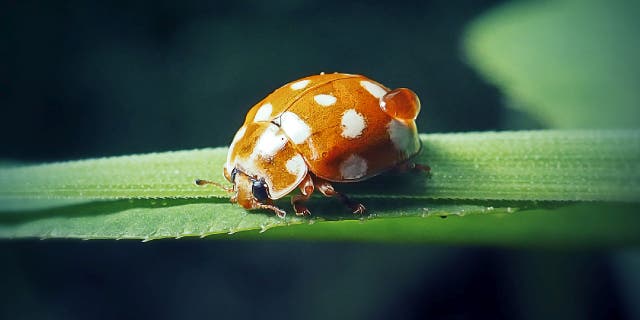

Spring brings showers, flowers and a ton of insects.
This includes ladybugs – one of the rare insect species people aren’t rushing to crush – which is likely due to the belief that they’re a good omen.
Breakout Google searches for orange ladybugs include people looking up what orange ladybugs mean and their relation to "spirituality," according to recent search query data on Google Trends.
GOOD LUCK OMENS! WHY THE PRAYING MANTIS, BUTTERFLY AND LADYBUG ARE THOUGHT TO BRING GOOD THINGS
Here’s a quick look at the symbolism behind orange ladybugs along with facts about the unique insect and the color orange.

The coloration of the Oenopia sexareata ladybird beetle can range between orange, coral, pink, tan and red. This species of ladybug is usually seen without spots on its protective shell. (iStock)
Similar to red ladybugs, orange ladybugs are often viewed as good luck charms by people who frequently look for spiritual symbols.
Linda Star Wolf, of North Carolina, a therapist and shamanic guide, outlined the meanings that have been assigned to ladybugs throughout history in her book, "Shamanic Breathwork: The Nature of Change."
Ladybugs of all colors have long been associated with good fortune, protection, love, fertility, rebirth and evolution, according to Wolf.
A nature symbolism-focused blog post from The Mindful Librarian, which is run by New York-based author Jennifer Bleicher, has noted that ladybugs are commonly viewed as good luck symbols.
KANSAS BOY FINDS RARE PINK GRASSHOPPER WHILE HUNTING FOR BUGS IN FAMILY'S YARD
Multiple resources that cover symbolic meanings agree that orange ladybugs are usually associated with positive traits, such as happiness, creativity and good health.

Cream-spot lady beetles (also known as Calvia quatuordecimguttata) can range between orange, brown and black. The protective shell can have spots that range between white, red and black. (iStock)
There are almost 6,000 ladybug species that exist around the world and nearly 500 species can be found in North America, according to a report from the National Park Service (NPS).
Of the many species that exist, the protective shell on a ladybug can vary between red, yellow, black and an amalgamation of other colors.
A ladybug classification chart on Animal Spot, an online animal encyclopedia that gathers information on mammals, amphibians, reptiles and insects, shows that common ladybug species can be beige, brown, pink and orange.
REPELLING FLIES WITH WATER AND PENNIES: DOES THE TRICK WORK?
Ladybug species that are usually orange in appearance include two-spot ladybirds, nine-spotted lady beetles, convergent lady beetles, large leaf-eating ladybirds, 10-spotted ladybirds, eyed ladybugs, transverse ladybirds and 13-spot lady beetles.
Asian lady beetles, also known as "Harmonia axyridis" or "harlequins," which are native to China, Korea, Japan and parts of Russia, can have an orange appearance.
The species has distinct M- or W-shaped markings, and they were brought to the United States by the Department of Agriculture from the 1960s to 1990s as a natural pest control method for pecan and apple trees, according to the University of Kentucky’s College of Agriculture Food and Environment.
Asian lady beetles were reportedly released in several states, including California, Connecticut, Georgia, Louisiana, Maryland, Mississippi, Pennsylvania, South Carolina and Washington.
WHAT ARE 'ANGEL NUMBERS' AND WHY DO PEOPLE KEEP SEEING THEM?
Some species of orange ladybugs are known to bite, but their bites typically don’t pierce the skin or cause pain, according to an article from The Pet Enthusiast, a pet care website.
Compared to other species of non-orange ladybugs, orange ladybugs reportedly "have higher levels of aggression" (except for nine-spotted lady beetles), but they aren’t venomous or poisonous to humans or transmitters of disease, according to The Pet Enthusiast.

The coloration of Asian lady beetles (also known as Harmonia axyridis) can range between orange, tan and red. The protective shell usually has black spots. (iStock)
The pet care website reported that orange ladybugs and similar insects can trigger allergies in rare cases and can be "harmful to pets" who "eat a large quantity of these bugs."
Healthline, a health information news company, reported that orange-tinted ladybugs and Asian lady beetles usually have toxins in their body and contain two proteins that can aggravate allergies, although they’re venomless.
"Orange ladybugs have historic and spiritual significance as they are connected to feelings of summer, high energy, vitality and fertility," The Pet Enthusiast concluded. "They aren’t killed in many countries they are native in as a result."

The color orange is made from red and yellow. The secondary hue can be mixed with white to create a tint (a paler color) or mixed with black to create a shade (a darker color) or mixed with gray to create a tone (a midway color). There are countless hues, tints, shades and tones of orange. (iStock)
A color psychology article from Verywell Mind, an online mental health information resource, noted that orange is a "strong and energetic" hue.
"People often describe the color orange as bright, happy and uplifting," the article said.
FOLLOW US ON FACEBOOK FOR MORE FOX LIFESTYLE NEWS
Words that are often associated with the color orange include optimism, positivity, warmth, luxury, prestige, creativity, pride and youthfulness.
Some also view the color orange as a sign of deceit, impatience and hopelessness, according to Verywell Mind.

The color orange is often associated with enlightenment and mindfulness in eastern religions and belief systems. (iStock)
In parts of Asia, the color orange is often worn by Buddhist and Hindu monks because the color has a spiritual meaning.
Color-Meanings.com, a color symbolism and design website, reported that in both eastern religions, the color orange (also known as "saffron," like the spice) signifies spiritual ascension, enlightenment, radiance, courage, renunciation, love and wisdom.
